BUIL 1220 CONSTRUCTION LEGISLATION
VerifiedAdded on 2022/08/14
|12
|2289
|24
AI Summary
Contribute Materials
Your contribution can guide someone’s learning journey. Share your
documents today.
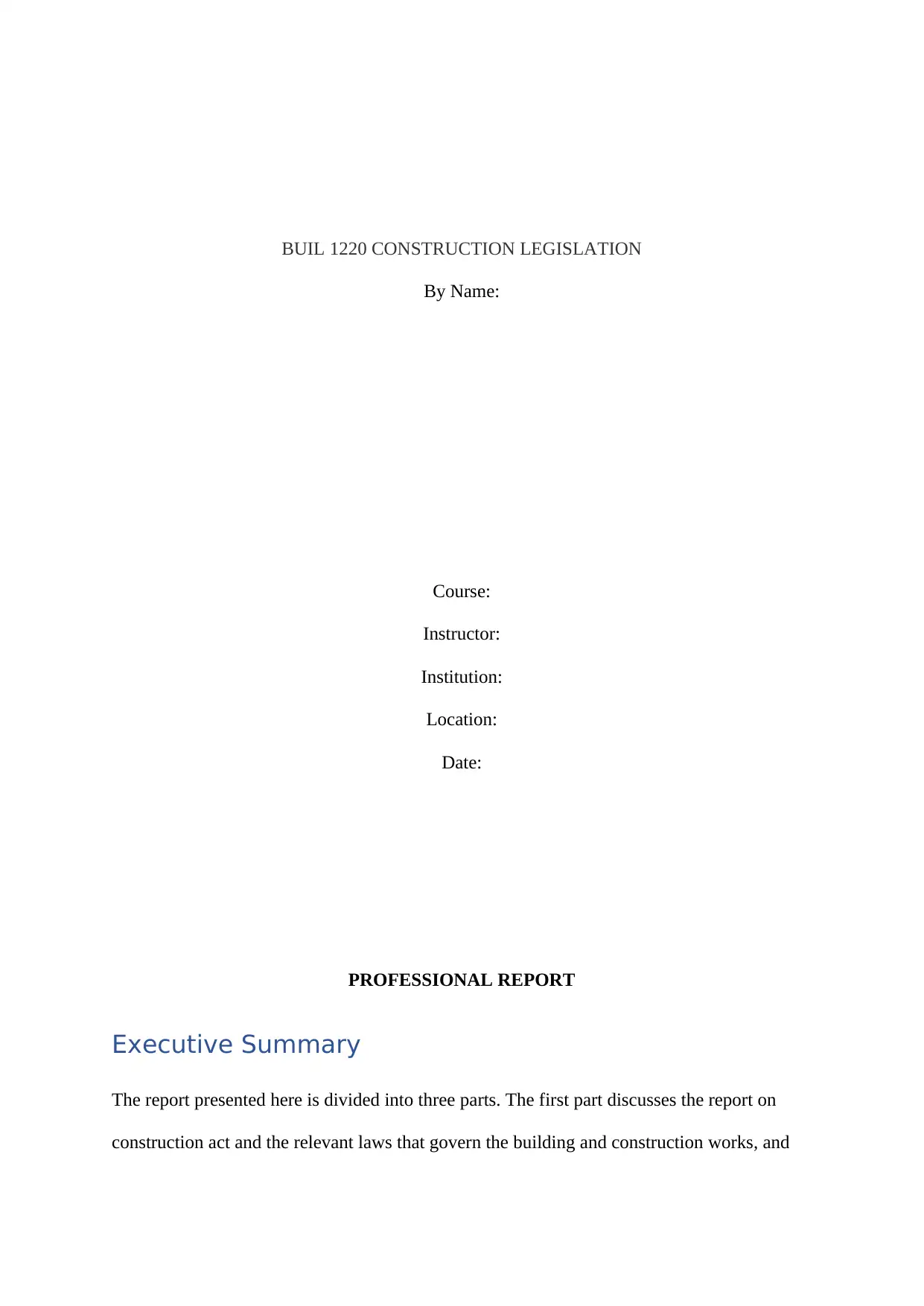
BUIL 1220 CONSTRUCTION LEGISLATION
By Name:
Course:
Instructor:
Institution:
Location:
Date:
PROFESSIONAL REPORT
Executive Summary
The report presented here is divided into three parts. The first part discusses the report on
construction act and the relevant laws that govern the building and construction works, and
By Name:
Course:
Instructor:
Institution:
Location:
Date:
PROFESSIONAL REPORT
Executive Summary
The report presented here is divided into three parts. The first part discusses the report on
construction act and the relevant laws that govern the building and construction works, and
Secure Best Marks with AI Grader
Need help grading? Try our AI Grader for instant feedback on your assignments.
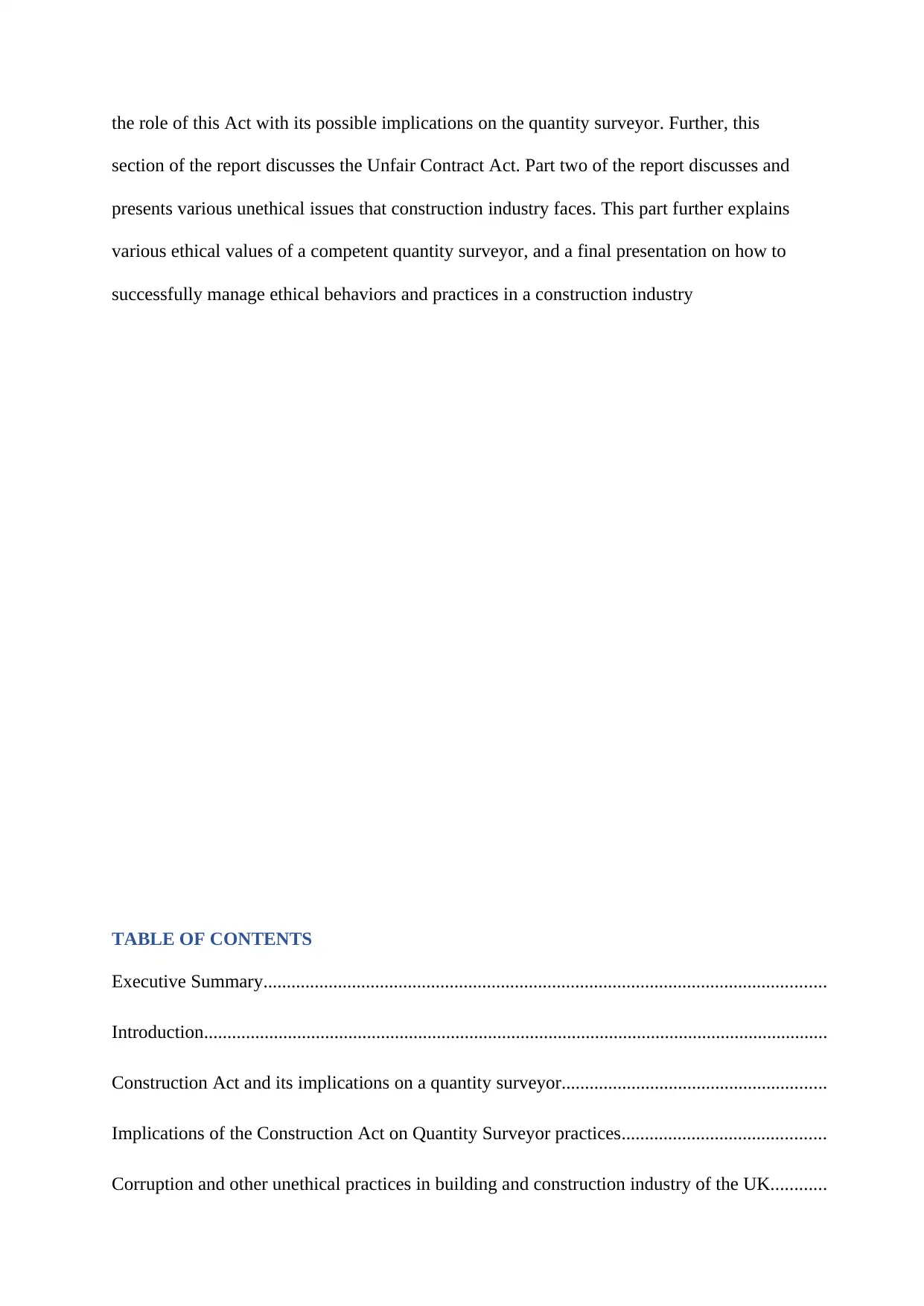
the role of this Act with its possible implications on the quantity surveyor. Further, this
section of the report discusses the Unfair Contract Act. Part two of the report discusses and
presents various unethical issues that construction industry faces. This part further explains
various ethical values of a competent quantity surveyor, and a final presentation on how to
successfully manage ethical behaviors and practices in a construction industry
TABLE OF CONTENTS
Executive Summary.........................................................................................................................
Introduction......................................................................................................................................
Construction Act and its implications on a quantity surveyor.........................................................
Implications of the Construction Act on Quantity Surveyor practices............................................
Corruption and other unethical practices in building and construction industry of the UK............
section of the report discusses the Unfair Contract Act. Part two of the report discusses and
presents various unethical issues that construction industry faces. This part further explains
various ethical values of a competent quantity surveyor, and a final presentation on how to
successfully manage ethical behaviors and practices in a construction industry
TABLE OF CONTENTS
Executive Summary.........................................................................................................................
Introduction......................................................................................................................................
Construction Act and its implications on a quantity surveyor.........................................................
Implications of the Construction Act on Quantity Surveyor practices............................................
Corruption and other unethical practices in building and construction industry of the UK............
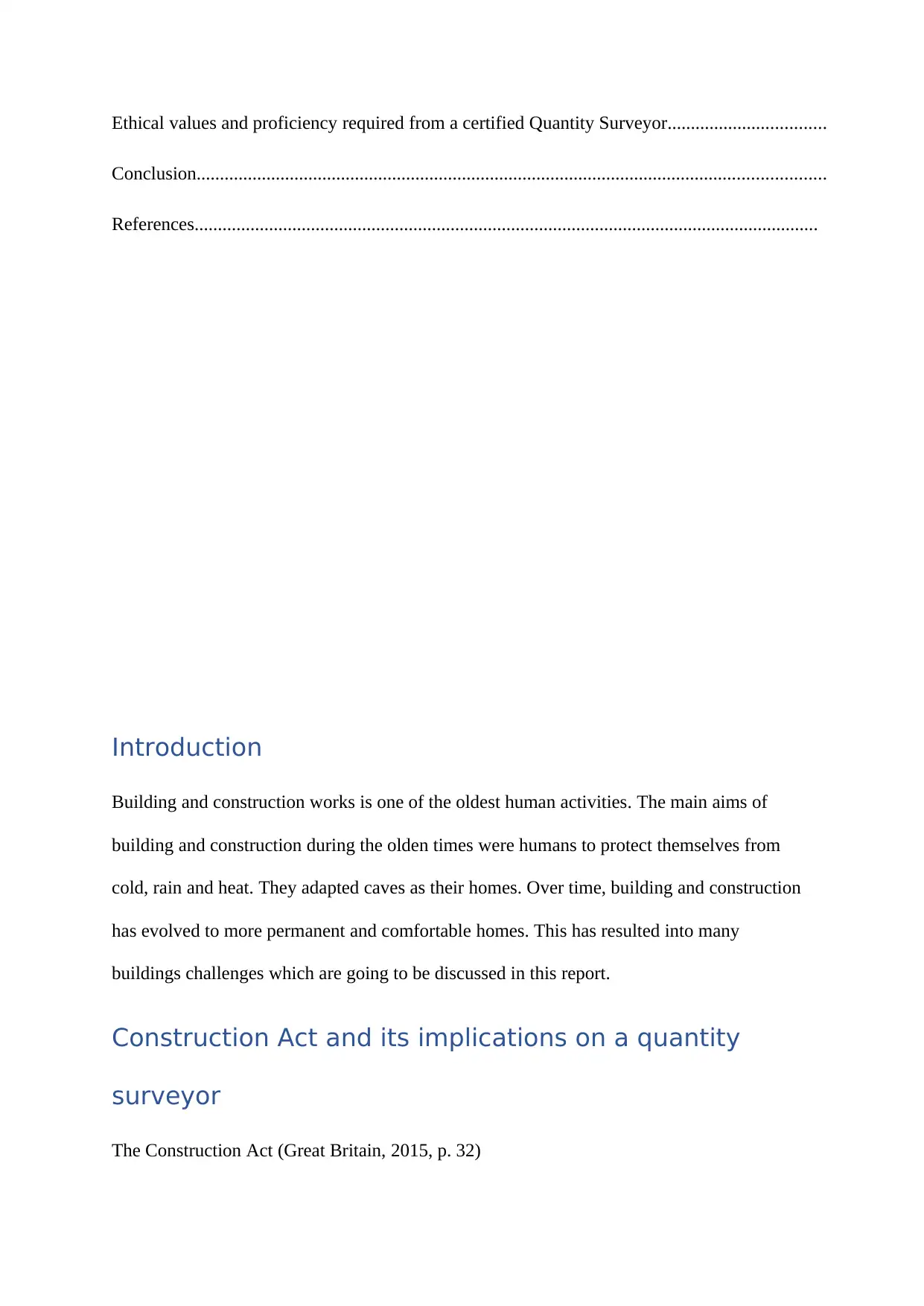
Ethical values and proficiency required from a certified Quantity Surveyor..................................
Conclusion.......................................................................................................................................
References......................................................................................................................................
Introduction
Building and construction works is one of the oldest human activities. The main aims of
building and construction during the olden times were humans to protect themselves from
cold, rain and heat. They adapted caves as their homes. Over time, building and construction
has evolved to more permanent and comfortable homes. This has resulted into many
buildings challenges which are going to be discussed in this report.
Construction Act and its implications on a quantity
surveyor
The Construction Act (Great Britain, 2015, p. 32)
Conclusion.......................................................................................................................................
References......................................................................................................................................
Introduction
Building and construction works is one of the oldest human activities. The main aims of
building and construction during the olden times were humans to protect themselves from
cold, rain and heat. They adapted caves as their homes. Over time, building and construction
has evolved to more permanent and comfortable homes. This has resulted into many
buildings challenges which are going to be discussed in this report.
Construction Act and its implications on a quantity
surveyor
The Construction Act (Great Britain, 2015, p. 32)
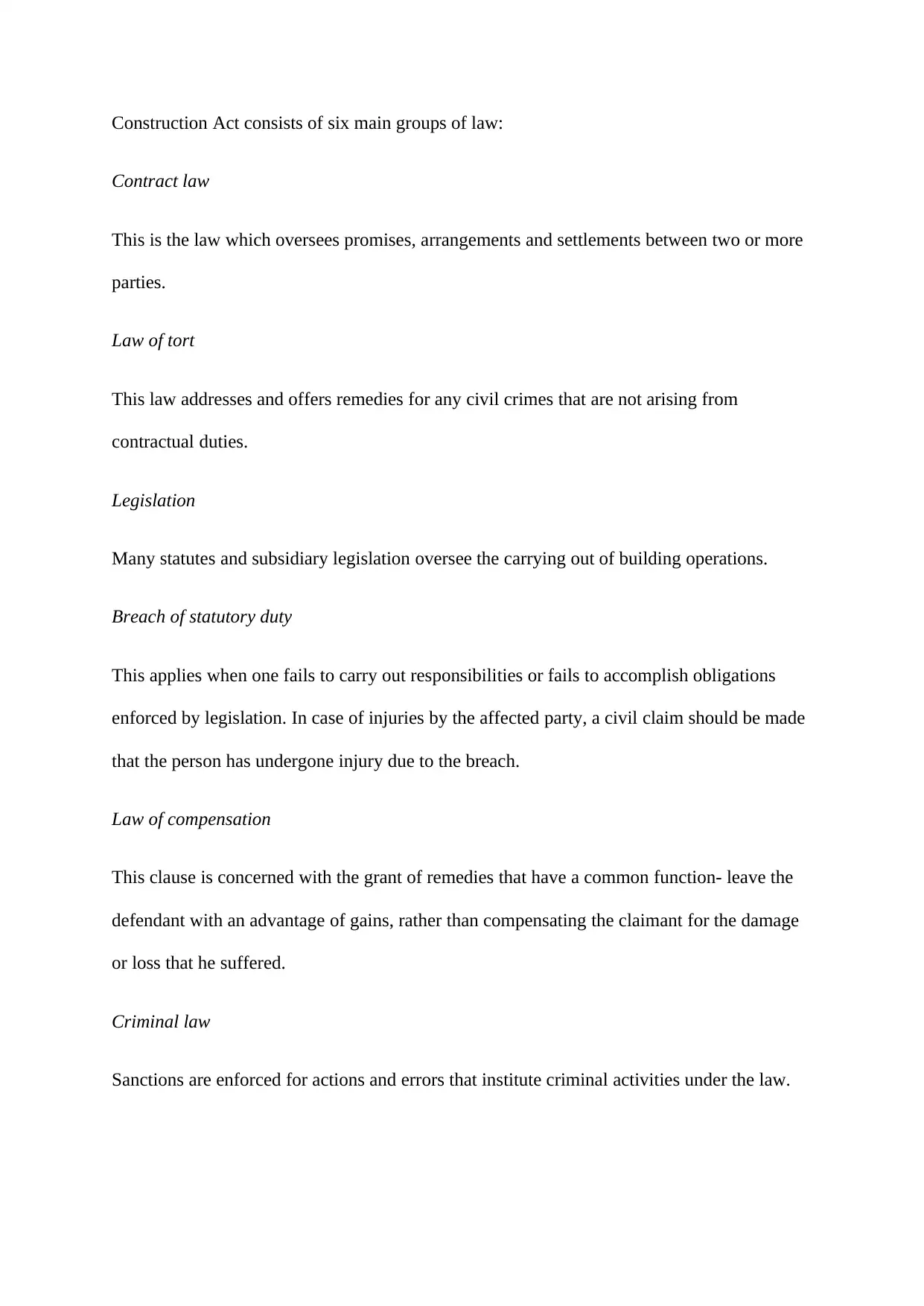
Construction Act consists of six main groups of law:
Contract law
This is the law which oversees promises, arrangements and settlements between two or more
parties.
Law of tort
This law addresses and offers remedies for any civil crimes that are not arising from
contractual duties.
Legislation
Many statutes and subsidiary legislation oversee the carrying out of building operations.
Breach of statutory duty
This applies when one fails to carry out responsibilities or fails to accomplish obligations
enforced by legislation. In case of injuries by the affected party, a civil claim should be made
that the person has undergone injury due to the breach.
Law of compensation
This clause is concerned with the grant of remedies that have a common function- leave the
defendant with an advantage of gains, rather than compensating the claimant for the damage
or loss that he suffered.
Criminal law
Sanctions are enforced for actions and errors that institute criminal activities under the law.
Contract law
This is the law which oversees promises, arrangements and settlements between two or more
parties.
Law of tort
This law addresses and offers remedies for any civil crimes that are not arising from
contractual duties.
Legislation
Many statutes and subsidiary legislation oversee the carrying out of building operations.
Breach of statutory duty
This applies when one fails to carry out responsibilities or fails to accomplish obligations
enforced by legislation. In case of injuries by the affected party, a civil claim should be made
that the person has undergone injury due to the breach.
Law of compensation
This clause is concerned with the grant of remedies that have a common function- leave the
defendant with an advantage of gains, rather than compensating the claimant for the damage
or loss that he suffered.
Criminal law
Sanctions are enforced for actions and errors that institute criminal activities under the law.
Secure Best Marks with AI Grader
Need help grading? Try our AI Grader for instant feedback on your assignments.
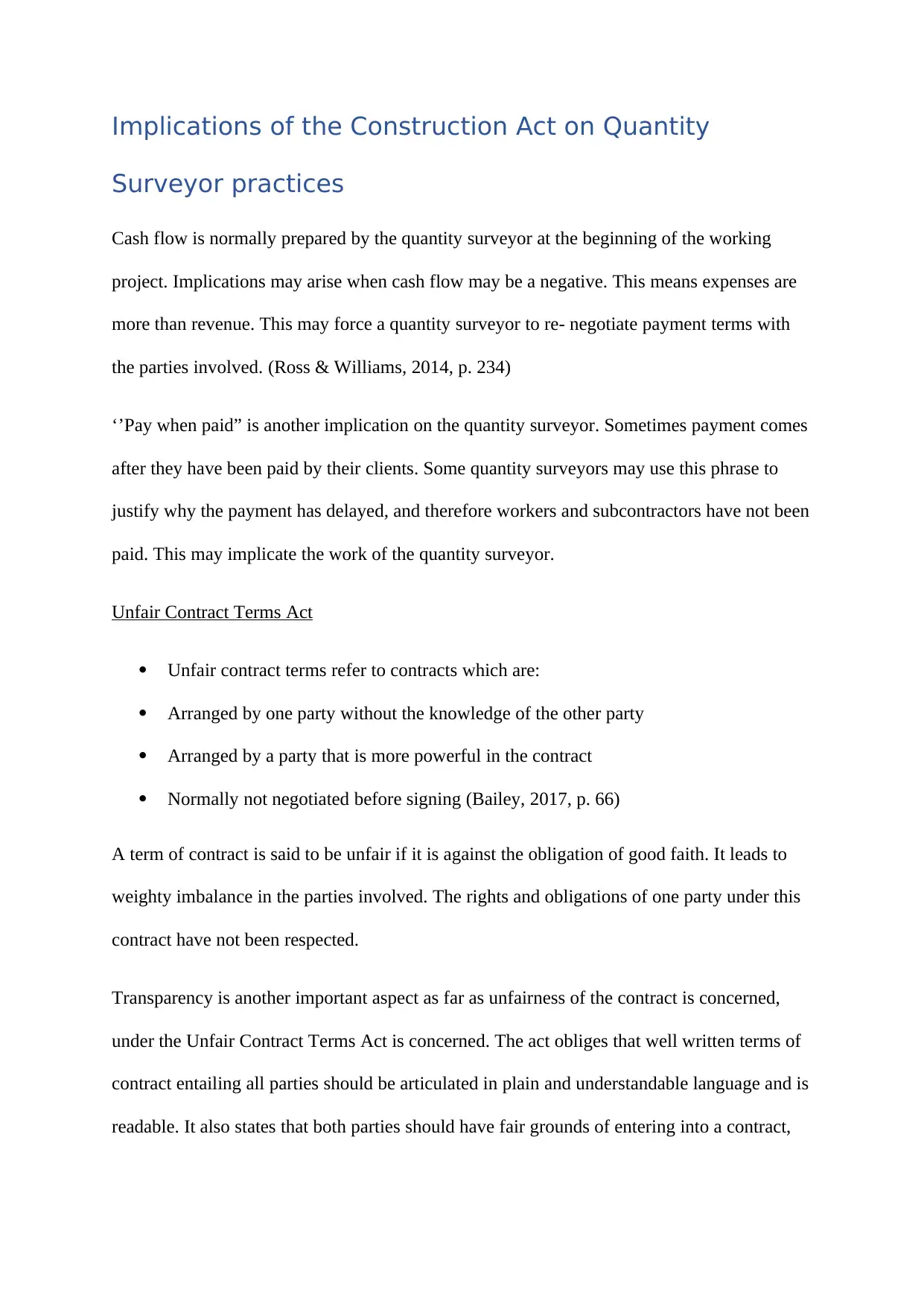
Implications of the Construction Act on Quantity
Surveyor practices
Cash flow is normally prepared by the quantity surveyor at the beginning of the working
project. Implications may arise when cash flow may be a negative. This means expenses are
more than revenue. This may force a quantity surveyor to re- negotiate payment terms with
the parties involved. (Ross & Williams, 2014, p. 234)
‘’Pay when paid” is another implication on the quantity surveyor. Sometimes payment comes
after they have been paid by their clients. Some quantity surveyors may use this phrase to
justify why the payment has delayed, and therefore workers and subcontractors have not been
paid. This may implicate the work of the quantity surveyor.
Unfair Contract Terms Act
Unfair contract terms refer to contracts which are:
Arranged by one party without the knowledge of the other party
Arranged by a party that is more powerful in the contract
Normally not negotiated before signing (Bailey, 2017, p. 66)
A term of contract is said to be unfair if it is against the obligation of good faith. It leads to
weighty imbalance in the parties involved. The rights and obligations of one party under this
contract have not been respected.
Transparency is another important aspect as far as unfairness of the contract is concerned,
under the Unfair Contract Terms Act is concerned. The act obliges that well written terms of
contract entailing all parties should be articulated in plain and understandable language and is
readable. It also states that both parties should have fair grounds of entering into a contract,
Surveyor practices
Cash flow is normally prepared by the quantity surveyor at the beginning of the working
project. Implications may arise when cash flow may be a negative. This means expenses are
more than revenue. This may force a quantity surveyor to re- negotiate payment terms with
the parties involved. (Ross & Williams, 2014, p. 234)
‘’Pay when paid” is another implication on the quantity surveyor. Sometimes payment comes
after they have been paid by their clients. Some quantity surveyors may use this phrase to
justify why the payment has delayed, and therefore workers and subcontractors have not been
paid. This may implicate the work of the quantity surveyor.
Unfair Contract Terms Act
Unfair contract terms refer to contracts which are:
Arranged by one party without the knowledge of the other party
Arranged by a party that is more powerful in the contract
Normally not negotiated before signing (Bailey, 2017, p. 66)
A term of contract is said to be unfair if it is against the obligation of good faith. It leads to
weighty imbalance in the parties involved. The rights and obligations of one party under this
contract have not been respected.
Transparency is another important aspect as far as unfairness of the contract is concerned,
under the Unfair Contract Terms Act is concerned. The act obliges that well written terms of
contract entailing all parties should be articulated in plain and understandable language and is
readable. It also states that both parties should have fair grounds of entering into a contract,
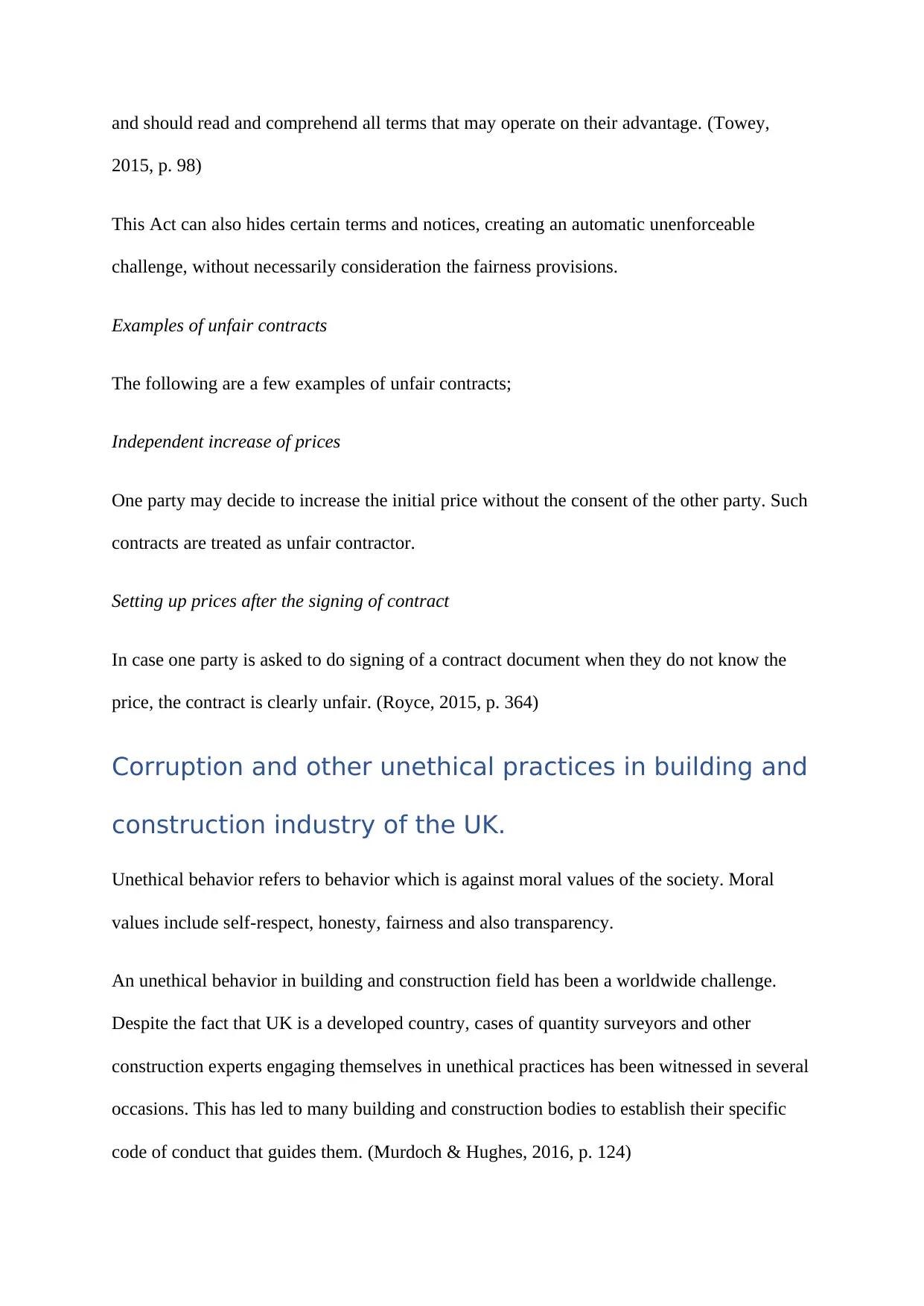
and should read and comprehend all terms that may operate on their advantage. (Towey,
2015, p. 98)
This Act can also hides certain terms and notices, creating an automatic unenforceable
challenge, without necessarily consideration the fairness provisions.
Examples of unfair contracts
The following are a few examples of unfair contracts;
Independent increase of prices
One party may decide to increase the initial price without the consent of the other party. Such
contracts are treated as unfair contractor.
Setting up prices after the signing of contract
In case one party is asked to do signing of a contract document when they do not know the
price, the contract is clearly unfair. (Royce, 2015, p. 364)
Corruption and other unethical practices in building and
construction industry of the UK.
Unethical behavior refers to behavior which is against moral values of the society. Moral
values include self-respect, honesty, fairness and also transparency.
An unethical behavior in building and construction field has been a worldwide challenge.
Despite the fact that UK is a developed country, cases of quantity surveyors and other
construction experts engaging themselves in unethical practices has been witnessed in several
occasions. This has led to many building and construction bodies to establish their specific
code of conduct that guides them. (Murdoch & Hughes, 2016, p. 124)
2015, p. 98)
This Act can also hides certain terms and notices, creating an automatic unenforceable
challenge, without necessarily consideration the fairness provisions.
Examples of unfair contracts
The following are a few examples of unfair contracts;
Independent increase of prices
One party may decide to increase the initial price without the consent of the other party. Such
contracts are treated as unfair contractor.
Setting up prices after the signing of contract
In case one party is asked to do signing of a contract document when they do not know the
price, the contract is clearly unfair. (Royce, 2015, p. 364)
Corruption and other unethical practices in building and
construction industry of the UK.
Unethical behavior refers to behavior which is against moral values of the society. Moral
values include self-respect, honesty, fairness and also transparency.
An unethical behavior in building and construction field has been a worldwide challenge.
Despite the fact that UK is a developed country, cases of quantity surveyors and other
construction experts engaging themselves in unethical practices has been witnessed in several
occasions. This has led to many building and construction bodies to establish their specific
code of conduct that guides them. (Murdoch & Hughes, 2016, p. 124)
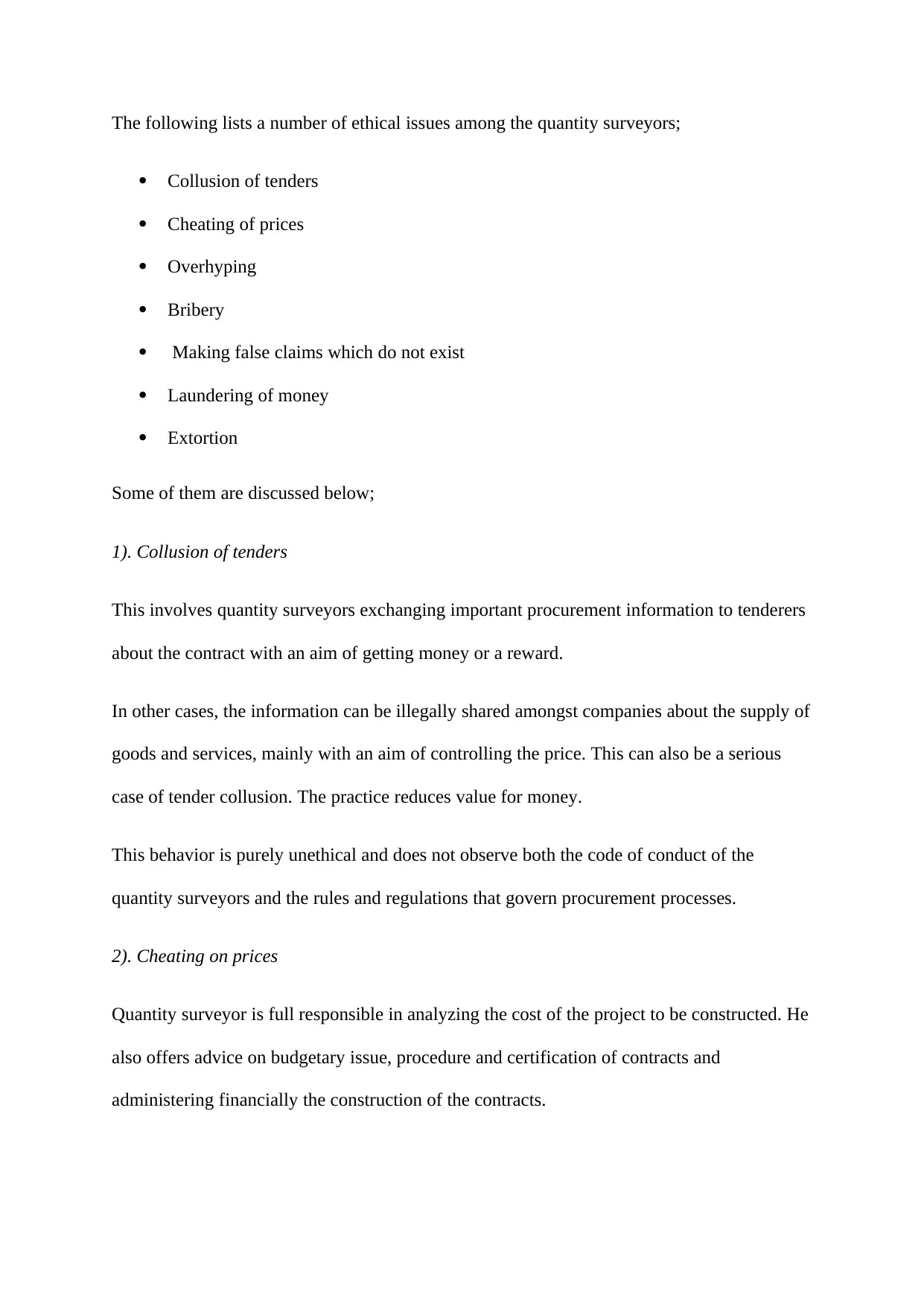
The following lists a number of ethical issues among the quantity surveyors;
Collusion of tenders
Cheating of prices
Overhyping
Bribery
Making false claims which do not exist
Laundering of money
Extortion
Some of them are discussed below;
1). Collusion of tenders
This involves quantity surveyors exchanging important procurement information to tenderers
about the contract with an aim of getting money or a reward.
In other cases, the information can be illegally shared amongst companies about the supply of
goods and services, mainly with an aim of controlling the price. This can also be a serious
case of tender collusion. The practice reduces value for money.
This behavior is purely unethical and does not observe both the code of conduct of the
quantity surveyors and the rules and regulations that govern procurement processes.
2). Cheating on prices
Quantity surveyor is full responsible in analyzing the cost of the project to be constructed. He
also offers advice on budgetary issue, procedure and certification of contracts and
administering financially the construction of the contracts.
Collusion of tenders
Cheating of prices
Overhyping
Bribery
Making false claims which do not exist
Laundering of money
Extortion
Some of them are discussed below;
1). Collusion of tenders
This involves quantity surveyors exchanging important procurement information to tenderers
about the contract with an aim of getting money or a reward.
In other cases, the information can be illegally shared amongst companies about the supply of
goods and services, mainly with an aim of controlling the price. This can also be a serious
case of tender collusion. The practice reduces value for money.
This behavior is purely unethical and does not observe both the code of conduct of the
quantity surveyors and the rules and regulations that govern procurement processes.
2). Cheating on prices
Quantity surveyor is full responsible in analyzing the cost of the project to be constructed. He
also offers advice on budgetary issue, procedure and certification of contracts and
administering financially the construction of the contracts.
Paraphrase This Document
Need a fresh take? Get an instant paraphrase of this document with our AI Paraphraser
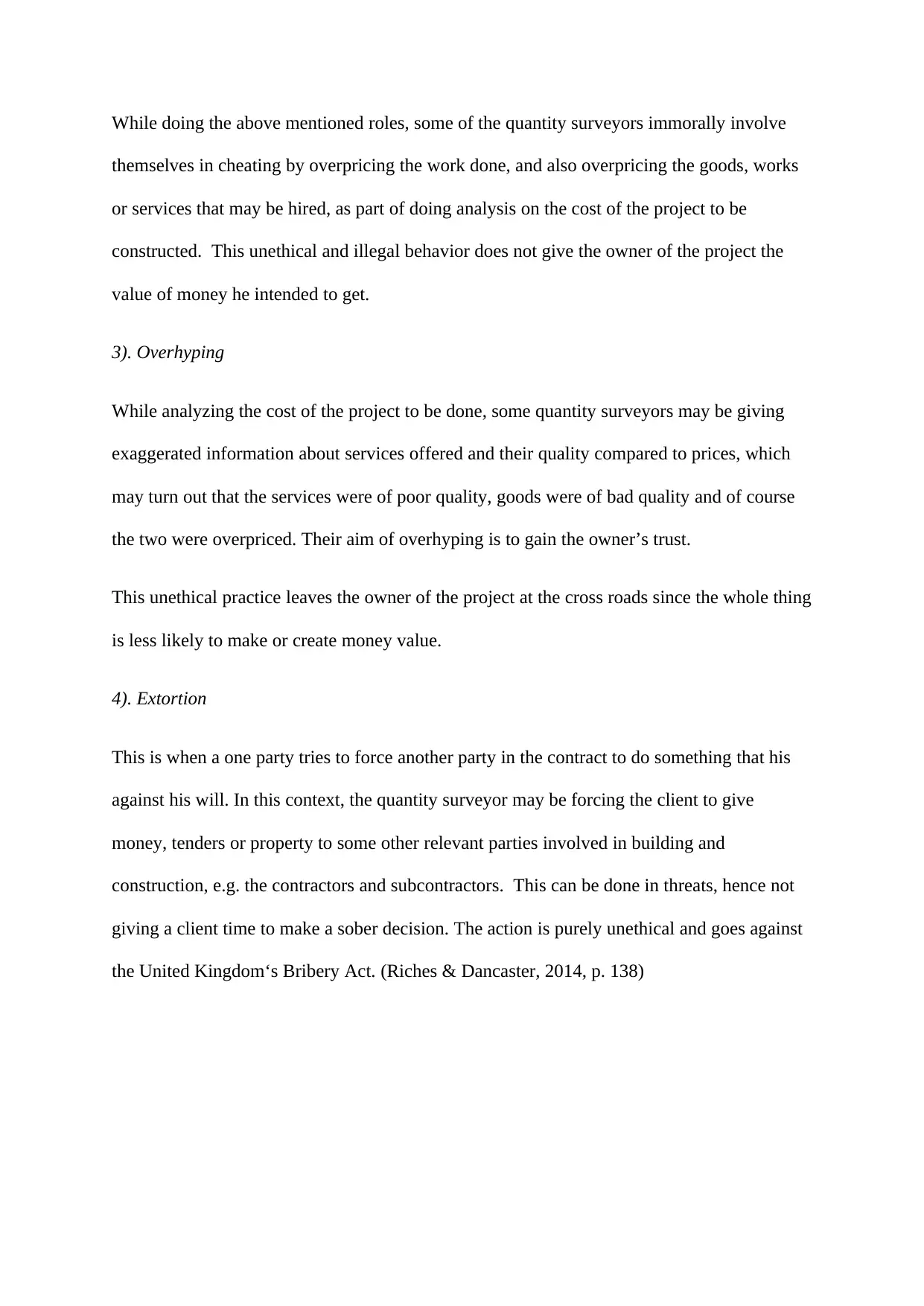
While doing the above mentioned roles, some of the quantity surveyors immorally involve
themselves in cheating by overpricing the work done, and also overpricing the goods, works
or services that may be hired, as part of doing analysis on the cost of the project to be
constructed. This unethical and illegal behavior does not give the owner of the project the
value of money he intended to get.
3). Overhyping
While analyzing the cost of the project to be done, some quantity surveyors may be giving
exaggerated information about services offered and their quality compared to prices, which
may turn out that the services were of poor quality, goods were of bad quality and of course
the two were overpriced. Their aim of overhyping is to gain the owner’s trust.
This unethical practice leaves the owner of the project at the cross roads since the whole thing
is less likely to make or create money value.
4). Extortion
This is when a one party tries to force another party in the contract to do something that his
against his will. In this context, the quantity surveyor may be forcing the client to give
money, tenders or property to some other relevant parties involved in building and
construction, e.g. the contractors and subcontractors. This can be done in threats, hence not
giving a client time to make a sober decision. The action is purely unethical and goes against
the United Kingdom‘s Bribery Act. (Riches & Dancaster, 2014, p. 138)
themselves in cheating by overpricing the work done, and also overpricing the goods, works
or services that may be hired, as part of doing analysis on the cost of the project to be
constructed. This unethical and illegal behavior does not give the owner of the project the
value of money he intended to get.
3). Overhyping
While analyzing the cost of the project to be done, some quantity surveyors may be giving
exaggerated information about services offered and their quality compared to prices, which
may turn out that the services were of poor quality, goods were of bad quality and of course
the two were overpriced. Their aim of overhyping is to gain the owner’s trust.
This unethical practice leaves the owner of the project at the cross roads since the whole thing
is less likely to make or create money value.
4). Extortion
This is when a one party tries to force another party in the contract to do something that his
against his will. In this context, the quantity surveyor may be forcing the client to give
money, tenders or property to some other relevant parties involved in building and
construction, e.g. the contractors and subcontractors. This can be done in threats, hence not
giving a client time to make a sober decision. The action is purely unethical and goes against
the United Kingdom‘s Bribery Act. (Riches & Dancaster, 2014, p. 138)
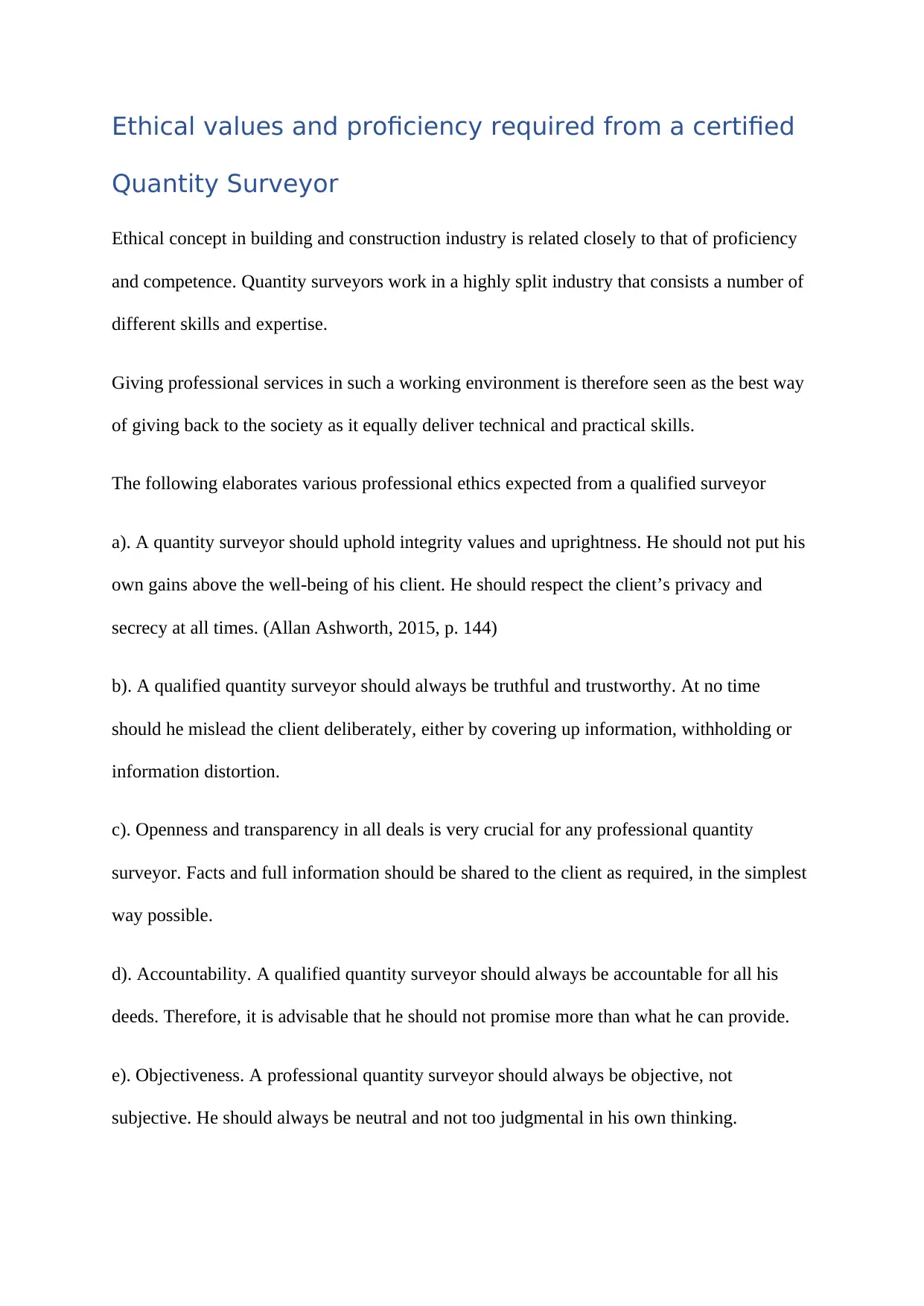
Ethical values and proficiency required from a certified
Quantity Surveyor
Ethical concept in building and construction industry is related closely to that of proficiency
and competence. Quantity surveyors work in a highly split industry that consists a number of
different skills and expertise.
Giving professional services in such a working environment is therefore seen as the best way
of giving back to the society as it equally deliver technical and practical skills.
The following elaborates various professional ethics expected from a qualified surveyor
a). A quantity surveyor should uphold integrity values and uprightness. He should not put his
own gains above the well-being of his client. He should respect the client’s privacy and
secrecy at all times. (Allan Ashworth, 2015, p. 144)
b). A qualified quantity surveyor should always be truthful and trustworthy. At no time
should he mislead the client deliberately, either by covering up information, withholding or
information distortion.
c). Openness and transparency in all deals is very crucial for any professional quantity
surveyor. Facts and full information should be shared to the client as required, in the simplest
way possible.
d). Accountability. A qualified quantity surveyor should always be accountable for all his
deeds. Therefore, it is advisable that he should not promise more than what he can provide.
e). Objectiveness. A professional quantity surveyor should always be objective, not
subjective. He should always be neutral and not too judgmental in his own thinking.
Quantity Surveyor
Ethical concept in building and construction industry is related closely to that of proficiency
and competence. Quantity surveyors work in a highly split industry that consists a number of
different skills and expertise.
Giving professional services in such a working environment is therefore seen as the best way
of giving back to the society as it equally deliver technical and practical skills.
The following elaborates various professional ethics expected from a qualified surveyor
a). A quantity surveyor should uphold integrity values and uprightness. He should not put his
own gains above the well-being of his client. He should respect the client’s privacy and
secrecy at all times. (Allan Ashworth, 2015, p. 144)
b). A qualified quantity surveyor should always be truthful and trustworthy. At no time
should he mislead the client deliberately, either by covering up information, withholding or
information distortion.
c). Openness and transparency in all deals is very crucial for any professional quantity
surveyor. Facts and full information should be shared to the client as required, in the simplest
way possible.
d). Accountability. A qualified quantity surveyor should always be accountable for all his
deeds. Therefore, it is advisable that he should not promise more than what he can provide.
e). Objectiveness. A professional quantity surveyor should always be objective, not
subjective. He should always be neutral and not too judgmental in his own thinking.
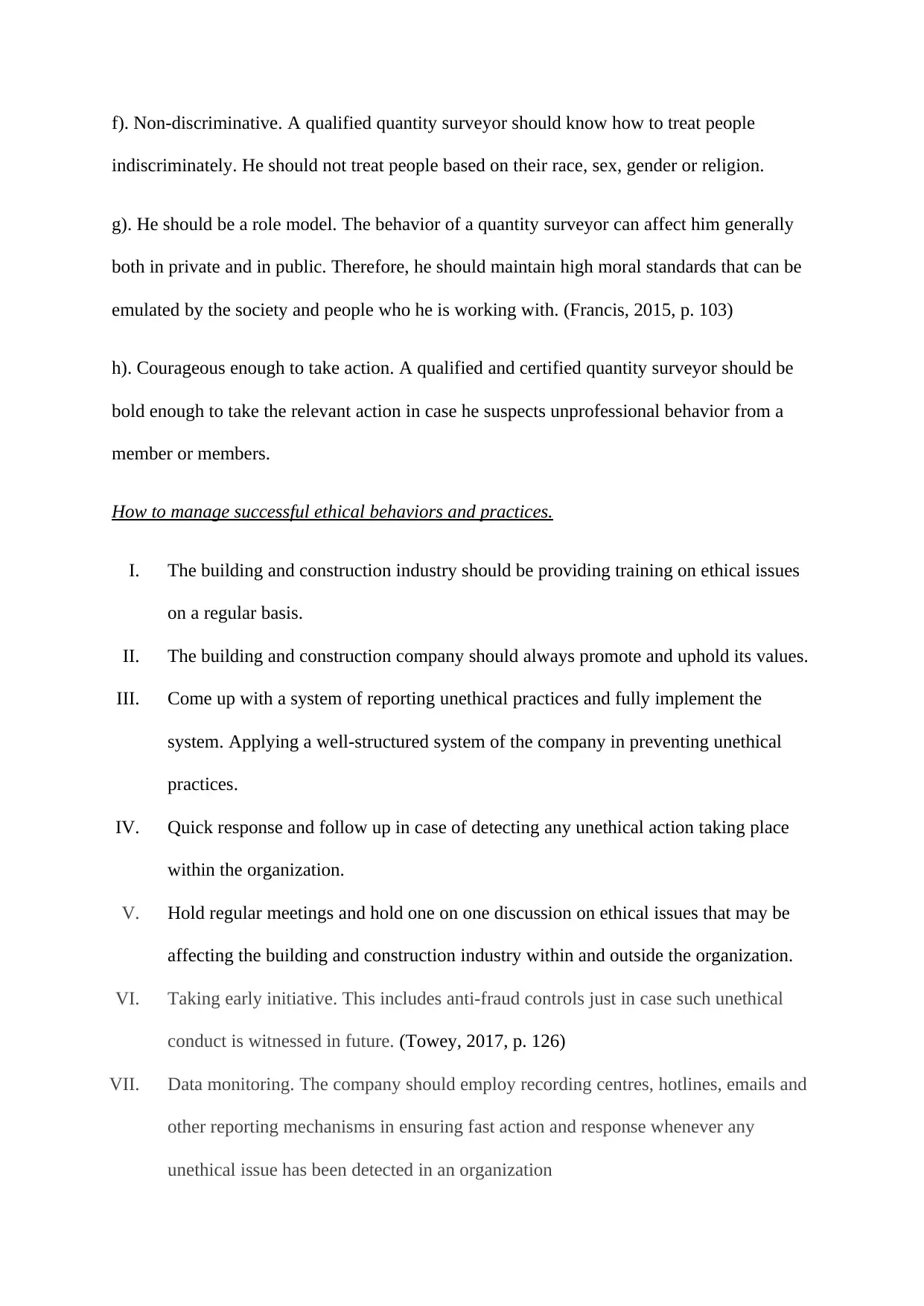
f). Non-discriminative. A qualified quantity surveyor should know how to treat people
indiscriminately. He should not treat people based on their race, sex, gender or religion.
g). He should be a role model. The behavior of a quantity surveyor can affect him generally
both in private and in public. Therefore, he should maintain high moral standards that can be
emulated by the society and people who he is working with. (Francis, 2015, p. 103)
h). Courageous enough to take action. A qualified and certified quantity surveyor should be
bold enough to take the relevant action in case he suspects unprofessional behavior from a
member or members.
How to manage successful ethical behaviors and practices.
I. The building and construction industry should be providing training on ethical issues
on a regular basis.
II. The building and construction company should always promote and uphold its values.
III. Come up with a system of reporting unethical practices and fully implement the
system. Applying a well-structured system of the company in preventing unethical
practices.
IV. Quick response and follow up in case of detecting any unethical action taking place
within the organization.
V. Hold regular meetings and hold one on one discussion on ethical issues that may be
affecting the building and construction industry within and outside the organization.
VI. Taking early initiative. This includes anti-fraud controls just in case such unethical
conduct is witnessed in future. (Towey, 2017, p. 126)
VII. Data monitoring. The company should employ recording centres, hotlines, emails and
other reporting mechanisms in ensuring fast action and response whenever any
unethical issue has been detected in an organization
indiscriminately. He should not treat people based on their race, sex, gender or religion.
g). He should be a role model. The behavior of a quantity surveyor can affect him generally
both in private and in public. Therefore, he should maintain high moral standards that can be
emulated by the society and people who he is working with. (Francis, 2015, p. 103)
h). Courageous enough to take action. A qualified and certified quantity surveyor should be
bold enough to take the relevant action in case he suspects unprofessional behavior from a
member or members.
How to manage successful ethical behaviors and practices.
I. The building and construction industry should be providing training on ethical issues
on a regular basis.
II. The building and construction company should always promote and uphold its values.
III. Come up with a system of reporting unethical practices and fully implement the
system. Applying a well-structured system of the company in preventing unethical
practices.
IV. Quick response and follow up in case of detecting any unethical action taking place
within the organization.
V. Hold regular meetings and hold one on one discussion on ethical issues that may be
affecting the building and construction industry within and outside the organization.
VI. Taking early initiative. This includes anti-fraud controls just in case such unethical
conduct is witnessed in future. (Towey, 2017, p. 126)
VII. Data monitoring. The company should employ recording centres, hotlines, emails and
other reporting mechanisms in ensuring fast action and response whenever any
unethical issue has been detected in an organization
Secure Best Marks with AI Grader
Need help grading? Try our AI Grader for instant feedback on your assignments.
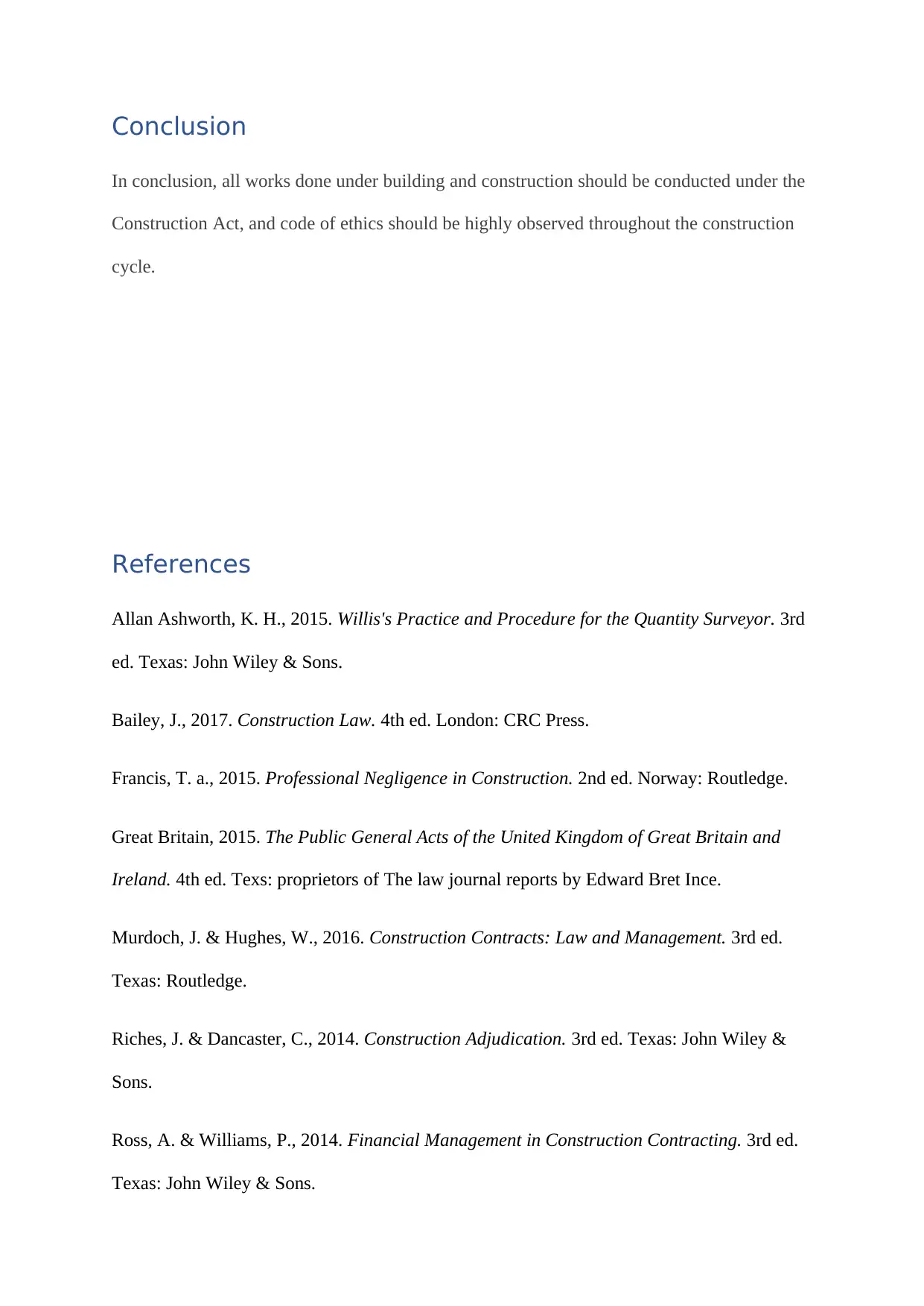
Conclusion
In conclusion, all works done under building and construction should be conducted under the
Construction Act, and code of ethics should be highly observed throughout the construction
cycle.
References
Allan Ashworth, K. H., 2015. Willis's Practice and Procedure for the Quantity Surveyor. 3rd
ed. Texas: John Wiley & Sons.
Bailey, J., 2017. Construction Law. 4th ed. London: CRC Press.
Francis, T. a., 2015. Professional Negligence in Construction. 2nd ed. Norway: Routledge.
Great Britain, 2015. The Public General Acts of the United Kingdom of Great Britain and
Ireland. 4th ed. Texs: proprietors of The law journal reports by Edward Bret Ince.
Murdoch, J. & Hughes, W., 2016. Construction Contracts: Law and Management. 3rd ed.
Texas: Routledge.
Riches, J. & Dancaster, C., 2014. Construction Adjudication. 3rd ed. Texas: John Wiley &
Sons.
Ross, A. & Williams, P., 2014. Financial Management in Construction Contracting. 3rd ed.
Texas: John Wiley & Sons.
In conclusion, all works done under building and construction should be conducted under the
Construction Act, and code of ethics should be highly observed throughout the construction
cycle.
References
Allan Ashworth, K. H., 2015. Willis's Practice and Procedure for the Quantity Surveyor. 3rd
ed. Texas: John Wiley & Sons.
Bailey, J., 2017. Construction Law. 4th ed. London: CRC Press.
Francis, T. a., 2015. Professional Negligence in Construction. 2nd ed. Norway: Routledge.
Great Britain, 2015. The Public General Acts of the United Kingdom of Great Britain and
Ireland. 4th ed. Texs: proprietors of The law journal reports by Edward Bret Ince.
Murdoch, J. & Hughes, W., 2016. Construction Contracts: Law and Management. 3rd ed.
Texas: Routledge.
Riches, J. & Dancaster, C., 2014. Construction Adjudication. 3rd ed. Texas: John Wiley &
Sons.
Ross, A. & Williams, P., 2014. Financial Management in Construction Contracting. 3rd ed.
Texas: John Wiley & Sons.
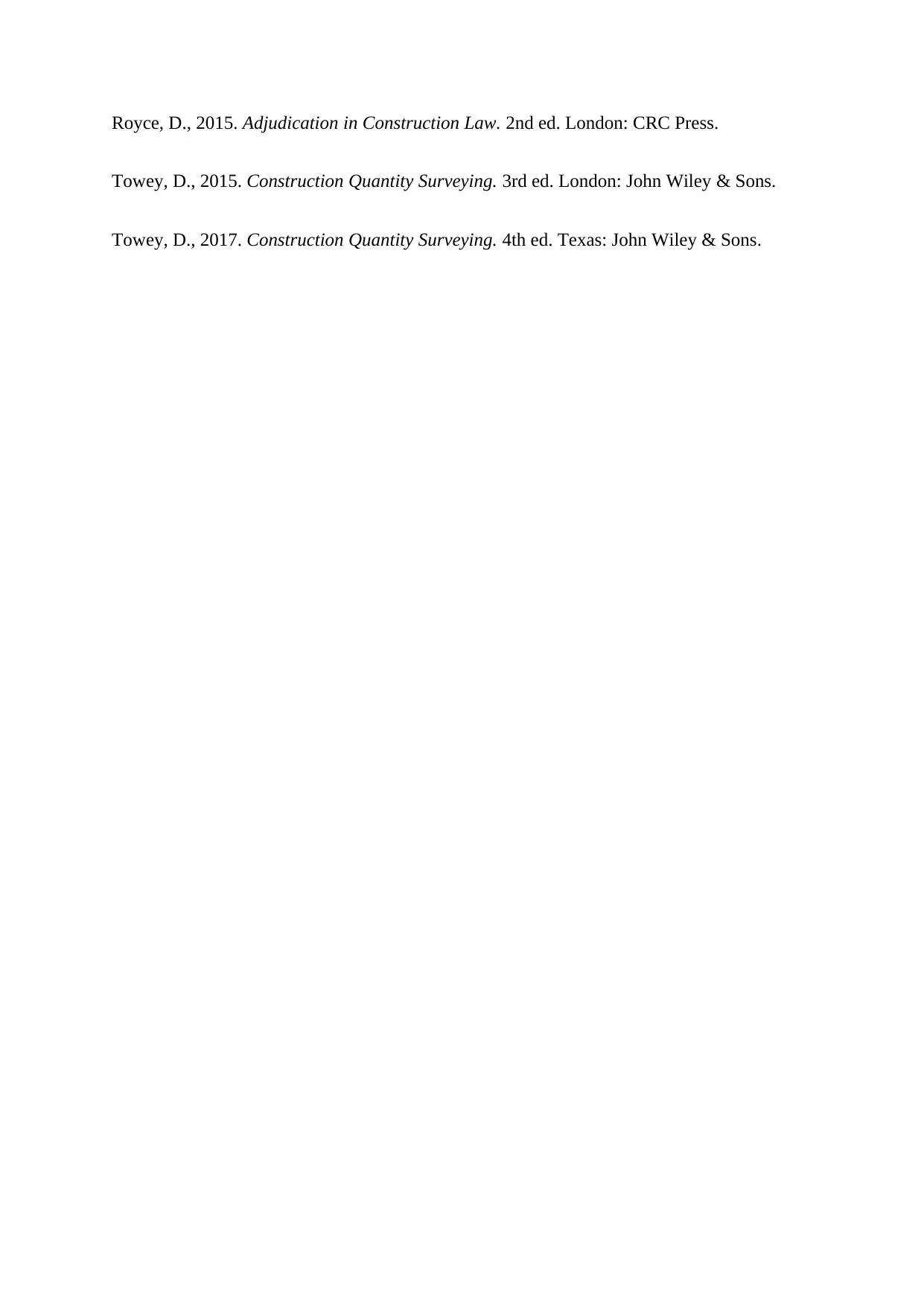
Royce, D., 2015. Adjudication in Construction Law. 2nd ed. London: CRC Press.
Towey, D., 2015. Construction Quantity Surveying. 3rd ed. London: John Wiley & Sons.
Towey, D., 2017. Construction Quantity Surveying. 4th ed. Texas: John Wiley & Sons.
Towey, D., 2015. Construction Quantity Surveying. 3rd ed. London: John Wiley & Sons.
Towey, D., 2017. Construction Quantity Surveying. 4th ed. Texas: John Wiley & Sons.
1 out of 12
Related Documents
Your All-in-One AI-Powered Toolkit for Academic Success.
+13062052269
info@desklib.com
Available 24*7 on WhatsApp / Email
![[object Object]](/_next/static/media/star-bottom.7253800d.svg)
Unlock your academic potential
© 2024 | Zucol Services PVT LTD | All rights reserved.



